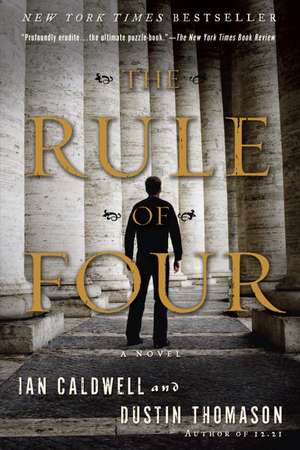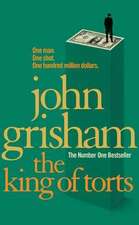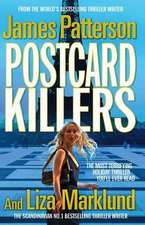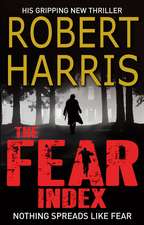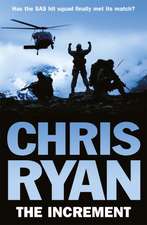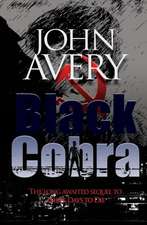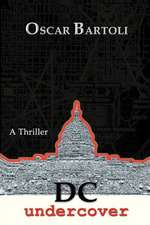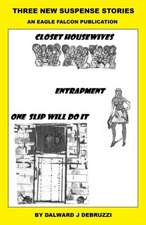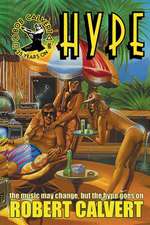The Rule of Four
Autor Ian Caldwell, Dustin Thomasonen Limba Engleză Paperback – 20 aug 2012
NEW YORK TIMES BESTSELLER
Princeton. Good Friday, 1999. On the eve of graduation, two friends are a hairsbreadth from solving the mysteries of the Hypnerotomachia Poliphili, a Renaissance text that has baffled scholars for centuries. Famous for its hypnotic power over those who study it, the five-hundred-year-old Hypnerotomachia may finally reveal its secrets—to Tom Sullivan, whose father was obsessed with the book, and Paul Harris, whose future depends on it.
As the deadline looms, research has stalled—until a vital clue is unearthed: a long-lost diary that may prove to be the key to deciphering the ancient text. But when a longtime student of the book is murdered just hours later, a chilling cycle of deaths and revelations begins—one that will force Tom and Paul into a fiery drama, spun from a book whose power and meaning have long been misunderstood.
“Profoundly erudite . . . the ultimate puzzle-book.”—The New York Times Book Review
| Toate formatele și edițiile | Preț | Express |
|---|---|---|
| Paperback (2) | 95.38 lei 3-5 săpt. | +14.01 lei 6-12 zile |
| Dial Press – 20 aug 2012 | 95.38 lei 3-5 săpt. | +14.01 lei 6-12 zile |
| CORNERSTONE – 6 iun 2013 | 108.27 lei 6-8 săpt. |
Preț: 95.38 lei
Nou
Puncte Express: 143
Preț estimativ în valută:
18.25€ • 19.19$ • 15.08£
18.25€ • 19.19$ • 15.08£
Carte disponibilă
Livrare economică 27 martie-10 aprilie
Livrare express 12-18 martie pentru 24.00 lei
Preluare comenzi: 021 569.72.76
Specificații
ISBN-13: 9780385337120
ISBN-10: 0385337124
Pagini: 400
Ilustrații: 7 ILLUSTRATIONS; 1 MAP
Dimensiuni: 142 x 210 x 23 mm
Greutate: 0.34 kg
Ediția:New.
Editura: Dial Press
ISBN-10: 0385337124
Pagini: 400
Ilustrații: 7 ILLUSTRATIONS; 1 MAP
Dimensiuni: 142 x 210 x 23 mm
Greutate: 0.34 kg
Ediția:New.
Editura: Dial Press
Notă biografică
Ian Caldwell is the author of a forthcoming novel set inside the Vatican. He graduated Phi Beta Kappa in European history from Princeton University, and lives near Washington, D.C., with his wife and three sons. Dustin Thomason is also the author of 12.21. He graduated from Harvard College and received his M.D. from Columbia University. Thomason has written and produced several television series, including Lie to Me. He lives in Venice Beach, California. The two have been best friends since they were eight years old.
Extras
Chapter One
Strange thing, time. It weighs most on those who have it least. Nothing is lighter than being young with the world on your shoulders; it gives you a feeling of possibility so seductive, you know there must be something more important you could be doing than studying for exams.
I can see myself now, the night it all began. I'm lying back on the old red sofa in our dorm room, wrestling with Pavlov and his dogs in my introductory psychology book, wondering why I never fulfilled my science requirement as a freshman like everyone else. A pair of letters sits on the coffee table in front of me, each containing a vision of what I could be doing next year. The night of Good Friday has fallen, cold April in Princeton, New Jersey, and with only a month of college left I'm no different from anyone else in the class of 1999: I'm having trouble getting my mind off the future.
Charlie is sitting on the floor by the cube refrigerator, playing with the Magnetic Shakespeare someone left in our room last week. The Fitzgerald novel he's supposed to be reading for his final paper in English 151w is spread open on the floor with its spine broken, like a butterfly somebody stepped on, and he's forming and re-forming sentences from magnets with Shakespearean words on them. If you ask him why he's not reading Fitzgerald, he'll grunt and say there's no
point. As far as he's concerned, literature is just an educated man's shell game, three-card monte for the college crowd: what you see is never what you get. For a science-minded guy like Charlie, that's the height of perversity. He's headed for medical school in the fall, but the rest of us are still hearing about the C-plus he found on his English midterm in March.
Gil glances over at us and smiles. He's been pretending to study for an economics exam, but Breakfast at Tiffany's is on, and Gil has a thing for old films, especially ones with Audrey Hepburn. His advice to Charlie was simple: if you don't want to read the book, then rent the movie. They'll never know. He's probably right, but Charlie sees something dishonest in that, and anyway it would prevent him from complaining about what a scam literature is, so instead of Daisy Buchanan we're watching Holly Golightly yet again.
I reach down and rearrange some of Charlie's words until the sentence at the top of the fridge says to fail or not to fail: that is the question. Charlie raises his head to give me a disapproving look. Sitting down, he's almost as tall as I am on the couch. When we stand next to each other he looks like Othello on steroids, a two-hundred-and-fifteen-pound black man who scrapes the ceilings at six-and-a-half feet. By contrast I'm five-foot-seven in shoes. Charlie likes to call us Red Giant and White Dwarf, because a red giant is a star that's unusually large and bright, while a white dwarf is small and dense and dull. I have to remind him that Napoleon was only five-foot-two, even if Paul is right that when you convert French feet to English, the emperor was actually taller.
Paul is the only one of us who isn't in the room now. He disappeared earlier in the day, and hasn't been seen since. Things between him and me have been rocky for the past month, and with all the academic pressure on him lately, he's chosen to do most of his studying at Ivy, the eating club where he and Gil are members. It's his senior thesis he's working on, the paper all Princeton undergrads must write in order to graduate. Charlie, Gil, and I would be doing the same ourselves, except that our departmental deadlines have already come and gone. Charlie identified a new protein interaction in certain neuronal signaling pathways; Gil managed something on the ramifications of a flat tax. I pasted mine together at the last minute between applications and interviews, and I'm sure Frankenstein scholarship will forever be the same.
The senior thesis is an institution that almost everyone despises. Alumni talk about their theses wistfully, as if they can't remember anything more enjoyable than writing one-hundred-page research papers while taking classes and choosing their professional futures. In reality, a senior thesis is a miserable, spine-breaking thing to write. It's an introduction to adult life, a sociology professor told Charlie and me once, in that annoying way professors have of lecturing after the lecture is over: it's about shouldering something so big, you can't get out from under it. It's called responsibility, he said. Try it on for size. Never mind that the only thing he was trying on for size was a pretty thesis advisee named Kim Silverman. It was all about responsibility. I'd have to agree with what Charlie said at the time. If Kim Silverman is the sort of thing adults can't get out from under, then sign me up. Otherwise, I'll take my chances being young.
Paul is the last of us to finish his thesis, and there's no question that his will be the best of the bunch. In fact, his may be the best of our entire graduating class, in the history department or any other. The magic of Paul's intelligence is that he has more patience than anyone I've ever met, and with it he simply wears problems down. To count a hundred million stars, he told me once, at the rate of one per second, sounds like a job that no one could possibly complete in a lifetime. In reality, it would only take three years. The key is focus, a willingness not to be distracted. And that is Paul's gift: an intuition of just how much a person can do slowly.
Maybe that's why everyone has such high expectations for his thesis--they know how many stars he could count in three years, but he's been working on his thesis for almost four. While the average student comes up with a research topic in the fall of senior year and finishes it by the next spring, Paul has been struggling with his since freshman year. Just a few months into our first fall semester, he decided to focus on a rare Renaissance text entitled Hypnerotomachia Poliphili, a labyrinthine name I can pronounce only because my father spent most of his career as a Renaissance historian studying it. Three and a half years later, and barely twenty-four hours from his deadline, Paul has enough material to make even the most discriminating graduate programs salivate.
The problem is, he thinks I ought to be enjoying the fanfare too. We worked on the book together for a few months during the winter, and made good progress as a team. Only then did I understand something my mother used to say: that men in our family had a tendency to fall for certain books about as hard as they fell for certain women. The Hypnerotomachia may never have had much outward charm, but it has an ugly woman's wiles, the slow addictive tug of inner mystery. When I caught myself slipping into it the same way my father had, I managed to pull myself out and throw in the towel before it could ruin my relationship with a girlfriend who deserved better. Since then, things between Paul and me haven't been the same. A graduate student he knows, Bill Stein, has helped with his research since I begged off. Now, as his thesis deadline approaches, Paul has become strangely guarded. He's usually much more forthcoming about his work, but over the past week he's withdrawn not only from me but from Charlie and Gil too, refusing to speak a word of his research to anyone.
"So, which way are you leaning, Tom?" Gil asks.
Charlie glances up from the fridge. "Yeah," he says, "we're all on tenterhooks."
Gil and I groan. Tenterhooks is one of the words Charlie missed on his midterm. He attributed it to Moby-Dick instead of Tobias Smollett's Adventures of Roderick Random on the grounds that it sounded more like a kind of fishing lure than a word for suspense. Now he won't let it go.
"Get over it," Gil says.
"Name me one doctor who knows what a tenterhook is," Charlie says.
Before either of us can answer, a rustling sound comes from inside the bedroom I share with Paul. Suddenly, standing before us at the door, wearing only boxers and a T-shirt, is Paul himself.
"Just one?" he asks, rubbing his eyes. "Tobias Smollett. He was a surgeon."
Charlie glances back at the magnets. "Figures."
Gil chuckles, but says nothing.
"We thought you went to Ivy," Charlie says, when the pause becomes noticeable.
Paul shakes his head, backtracking into his room to pick up his notebook. His straw-colored hair is pressed flat on one side, and there are pillow creases on his face. "Not enough privacy," he says. "I've been working in my bunk again. Fell asleep."
He's hardly gotten a wink in two nights, maybe more. Paul's advisor, Dr. Vincent Taft, has pressed him to produce more and more documentation every week--and unlike most advisors, who are happy to let seniors hang by the rope of their own expectations, Taft has kept a hand at Paul's back from the start.
"So, what about it, Tom?" Gil asks, filling the silence. "What's your decision?"
I glance up at the table. He's talking about the letters in front of me, which I've been eyeing between each sentence in my book. The first letter is from the University of Chicago, offering me admission to a doctoral program in English. Books are in my blood, the same way medical school is in Charlie's, and a Ph.D. from Chicago would suit me just fine. I did have to scrap for the acceptance letter a little more than I wanted to, partly because my grades at Princeton have been middling, but mainly because I don't know exactly what I want to do with myself, and a good graduate program can smell indecision like a dog can smell fear.
"Take the money," Gil says, never taking his eyes off Audrey Hepburn.
Gil is a banker's son from Manhattan. Princeton has never been a destination for him, just a window seat with a view, a stopover on the way to Wall Street. He is a caricature of himself in that respect, and he manages a smile whenever we give him a hard time about it. He'll be smiling all the way to the bank, we know: even Charlie, who's sure to make a small fortune as a doctor, won't hold a candle to the kind of paychecks Gil will see.
"Don't listen to him," Paul says from the other side of the room. "Follow your heart."
I look up, surprised that he's aware of anything but his thesis.
"Follow the money," Gil says, standing up to get a bottle of water from the refrigerator.
"What'd they offer?" Charlie asks, ignoring the magnets for a second.
"Forty-one," Gil guesses, and a few Elizabethan words tumble from the fridge as he closes it. "Bonus of five. Plus options."
Spring semester is job season, and 1999 is a buyer's market. Forty-one thousand dollars a year is roughly double what I expected to be earning with my lowly English degree, but compared to some of the deals I've seen classmates make, you'd think it was barely getting by.
I pick up the letter from Daedalus, an Internet firm in Austin that claims to have developed the world's most advanced software for streamlining the corporate back office. I know almost nothing about the company, let alone what a back office is, but a friend down the hall suggested I interview with them, and as rumors circulated about high starting salaries at this unknown Texas start-up, I went. Daedalus, following the general trend, didn't care that I knew nothing about them or their business. If I could just solve a few brainteasers at an interview, and seem reasonably articulate and friendly in the process, the job was mine. Thus, in good Caesarian fashion, I could, I did, and it was.
"Close," I say, reading from the letter. "Forty-three thousand a year. Signing bonus of three thousand. Fifteen hundred options."
"And a partridge in a pear tree," Paul adds from across the room. He's the only one acting like it's dirtier to talk about money than it is to touch it. "Vanity of vanities."
Charlie is shifting the magnets again. In a fulminating baritone he imitates the preacher at his church, a tiny black man from Georgia who just finished his degree at the Princeton Theological Seminary. "Vanity of vanities. All is vanities."
"Be honest with yourself, Tom," Paul says impatiently, though he never makes eye contact. "Any company that thinks you deserve a salary like that isn't going to be around for long. You don't even know what they do." He returns to his notebook, scribbling away. Like most prophets, he is fated to be ignored.
Gil keeps his focus on the television, but Charlie looks up, hearing the edge in Paul's voice. He rubs a hand along the stubble on his chin, then says, "All right, everybody stop. I think it's time to let off some steam."
For the first time, Gil turns away from the movie. He must hear what I hear: the faint emphasis on the word steam.
"Right now?" I ask.
Gil looks at his watch, taking to the idea. "We'd be clear for about half an hour," he says, and in a show of support he even turns off the television, letting Audrey fizzle into the tube.
Charlie flips his Fitzgerald shut, mischief stirring. The broken spine springs open in protest, but he tosses the book onto the couch.
"I'm working," Paul objects. "I need to finish this."
He glances at me oddly.
"What?" I ask.
But Paul remains silent.
"What's the problem, girls?" Charlie says impatiently.
"It's still snowing out there," I remind everyone.
The first snowstorm of the year came howling into town today, just when spring seemed perched on the tip of every tree branch. Now there are calls for a foot of accumulation, maybe more. The Easter weekend festivities on campus, which this year include a Good Friday lecture by Paul's thesis advisor, Vincent Taft, have been reorganized. This is hardly the weather for what Charlie has in mind.
"You don't have to meet Curry until 8:30, right?" Gil asks Paul, trying to convince him. "We'll be done by then. You can work more tonight."
Richard Curry, an eccentric former friend of my father's and Taft's, has been a mentor of Paul's since freshman year. He has put Paul in touch with some of the most prominent art historians in the world, and has funded much of Paul's research on the Hypnerotomachia.
Paul weighs his notebook in his hand. Just looking at it, the fatigue returns to his eyes.
From the Hardcover edition.
Strange thing, time. It weighs most on those who have it least. Nothing is lighter than being young with the world on your shoulders; it gives you a feeling of possibility so seductive, you know there must be something more important you could be doing than studying for exams.
I can see myself now, the night it all began. I'm lying back on the old red sofa in our dorm room, wrestling with Pavlov and his dogs in my introductory psychology book, wondering why I never fulfilled my science requirement as a freshman like everyone else. A pair of letters sits on the coffee table in front of me, each containing a vision of what I could be doing next year. The night of Good Friday has fallen, cold April in Princeton, New Jersey, and with only a month of college left I'm no different from anyone else in the class of 1999: I'm having trouble getting my mind off the future.
Charlie is sitting on the floor by the cube refrigerator, playing with the Magnetic Shakespeare someone left in our room last week. The Fitzgerald novel he's supposed to be reading for his final paper in English 151w is spread open on the floor with its spine broken, like a butterfly somebody stepped on, and he's forming and re-forming sentences from magnets with Shakespearean words on them. If you ask him why he's not reading Fitzgerald, he'll grunt and say there's no
point. As far as he's concerned, literature is just an educated man's shell game, three-card monte for the college crowd: what you see is never what you get. For a science-minded guy like Charlie, that's the height of perversity. He's headed for medical school in the fall, but the rest of us are still hearing about the C-plus he found on his English midterm in March.
Gil glances over at us and smiles. He's been pretending to study for an economics exam, but Breakfast at Tiffany's is on, and Gil has a thing for old films, especially ones with Audrey Hepburn. His advice to Charlie was simple: if you don't want to read the book, then rent the movie. They'll never know. He's probably right, but Charlie sees something dishonest in that, and anyway it would prevent him from complaining about what a scam literature is, so instead of Daisy Buchanan we're watching Holly Golightly yet again.
I reach down and rearrange some of Charlie's words until the sentence at the top of the fridge says to fail or not to fail: that is the question. Charlie raises his head to give me a disapproving look. Sitting down, he's almost as tall as I am on the couch. When we stand next to each other he looks like Othello on steroids, a two-hundred-and-fifteen-pound black man who scrapes the ceilings at six-and-a-half feet. By contrast I'm five-foot-seven in shoes. Charlie likes to call us Red Giant and White Dwarf, because a red giant is a star that's unusually large and bright, while a white dwarf is small and dense and dull. I have to remind him that Napoleon was only five-foot-two, even if Paul is right that when you convert French feet to English, the emperor was actually taller.
Paul is the only one of us who isn't in the room now. He disappeared earlier in the day, and hasn't been seen since. Things between him and me have been rocky for the past month, and with all the academic pressure on him lately, he's chosen to do most of his studying at Ivy, the eating club where he and Gil are members. It's his senior thesis he's working on, the paper all Princeton undergrads must write in order to graduate. Charlie, Gil, and I would be doing the same ourselves, except that our departmental deadlines have already come and gone. Charlie identified a new protein interaction in certain neuronal signaling pathways; Gil managed something on the ramifications of a flat tax. I pasted mine together at the last minute between applications and interviews, and I'm sure Frankenstein scholarship will forever be the same.
The senior thesis is an institution that almost everyone despises. Alumni talk about their theses wistfully, as if they can't remember anything more enjoyable than writing one-hundred-page research papers while taking classes and choosing their professional futures. In reality, a senior thesis is a miserable, spine-breaking thing to write. It's an introduction to adult life, a sociology professor told Charlie and me once, in that annoying way professors have of lecturing after the lecture is over: it's about shouldering something so big, you can't get out from under it. It's called responsibility, he said. Try it on for size. Never mind that the only thing he was trying on for size was a pretty thesis advisee named Kim Silverman. It was all about responsibility. I'd have to agree with what Charlie said at the time. If Kim Silverman is the sort of thing adults can't get out from under, then sign me up. Otherwise, I'll take my chances being young.
Paul is the last of us to finish his thesis, and there's no question that his will be the best of the bunch. In fact, his may be the best of our entire graduating class, in the history department or any other. The magic of Paul's intelligence is that he has more patience than anyone I've ever met, and with it he simply wears problems down. To count a hundred million stars, he told me once, at the rate of one per second, sounds like a job that no one could possibly complete in a lifetime. In reality, it would only take three years. The key is focus, a willingness not to be distracted. And that is Paul's gift: an intuition of just how much a person can do slowly.
Maybe that's why everyone has such high expectations for his thesis--they know how many stars he could count in three years, but he's been working on his thesis for almost four. While the average student comes up with a research topic in the fall of senior year and finishes it by the next spring, Paul has been struggling with his since freshman year. Just a few months into our first fall semester, he decided to focus on a rare Renaissance text entitled Hypnerotomachia Poliphili, a labyrinthine name I can pronounce only because my father spent most of his career as a Renaissance historian studying it. Three and a half years later, and barely twenty-four hours from his deadline, Paul has enough material to make even the most discriminating graduate programs salivate.
The problem is, he thinks I ought to be enjoying the fanfare too. We worked on the book together for a few months during the winter, and made good progress as a team. Only then did I understand something my mother used to say: that men in our family had a tendency to fall for certain books about as hard as they fell for certain women. The Hypnerotomachia may never have had much outward charm, but it has an ugly woman's wiles, the slow addictive tug of inner mystery. When I caught myself slipping into it the same way my father had, I managed to pull myself out and throw in the towel before it could ruin my relationship with a girlfriend who deserved better. Since then, things between Paul and me haven't been the same. A graduate student he knows, Bill Stein, has helped with his research since I begged off. Now, as his thesis deadline approaches, Paul has become strangely guarded. He's usually much more forthcoming about his work, but over the past week he's withdrawn not only from me but from Charlie and Gil too, refusing to speak a word of his research to anyone.
"So, which way are you leaning, Tom?" Gil asks.
Charlie glances up from the fridge. "Yeah," he says, "we're all on tenterhooks."
Gil and I groan. Tenterhooks is one of the words Charlie missed on his midterm. He attributed it to Moby-Dick instead of Tobias Smollett's Adventures of Roderick Random on the grounds that it sounded more like a kind of fishing lure than a word for suspense. Now he won't let it go.
"Get over it," Gil says.
"Name me one doctor who knows what a tenterhook is," Charlie says.
Before either of us can answer, a rustling sound comes from inside the bedroom I share with Paul. Suddenly, standing before us at the door, wearing only boxers and a T-shirt, is Paul himself.
"Just one?" he asks, rubbing his eyes. "Tobias Smollett. He was a surgeon."
Charlie glances back at the magnets. "Figures."
Gil chuckles, but says nothing.
"We thought you went to Ivy," Charlie says, when the pause becomes noticeable.
Paul shakes his head, backtracking into his room to pick up his notebook. His straw-colored hair is pressed flat on one side, and there are pillow creases on his face. "Not enough privacy," he says. "I've been working in my bunk again. Fell asleep."
He's hardly gotten a wink in two nights, maybe more. Paul's advisor, Dr. Vincent Taft, has pressed him to produce more and more documentation every week--and unlike most advisors, who are happy to let seniors hang by the rope of their own expectations, Taft has kept a hand at Paul's back from the start.
"So, what about it, Tom?" Gil asks, filling the silence. "What's your decision?"
I glance up at the table. He's talking about the letters in front of me, which I've been eyeing between each sentence in my book. The first letter is from the University of Chicago, offering me admission to a doctoral program in English. Books are in my blood, the same way medical school is in Charlie's, and a Ph.D. from Chicago would suit me just fine. I did have to scrap for the acceptance letter a little more than I wanted to, partly because my grades at Princeton have been middling, but mainly because I don't know exactly what I want to do with myself, and a good graduate program can smell indecision like a dog can smell fear.
"Take the money," Gil says, never taking his eyes off Audrey Hepburn.
Gil is a banker's son from Manhattan. Princeton has never been a destination for him, just a window seat with a view, a stopover on the way to Wall Street. He is a caricature of himself in that respect, and he manages a smile whenever we give him a hard time about it. He'll be smiling all the way to the bank, we know: even Charlie, who's sure to make a small fortune as a doctor, won't hold a candle to the kind of paychecks Gil will see.
"Don't listen to him," Paul says from the other side of the room. "Follow your heart."
I look up, surprised that he's aware of anything but his thesis.
"Follow the money," Gil says, standing up to get a bottle of water from the refrigerator.
"What'd they offer?" Charlie asks, ignoring the magnets for a second.
"Forty-one," Gil guesses, and a few Elizabethan words tumble from the fridge as he closes it. "Bonus of five. Plus options."
Spring semester is job season, and 1999 is a buyer's market. Forty-one thousand dollars a year is roughly double what I expected to be earning with my lowly English degree, but compared to some of the deals I've seen classmates make, you'd think it was barely getting by.
I pick up the letter from Daedalus, an Internet firm in Austin that claims to have developed the world's most advanced software for streamlining the corporate back office. I know almost nothing about the company, let alone what a back office is, but a friend down the hall suggested I interview with them, and as rumors circulated about high starting salaries at this unknown Texas start-up, I went. Daedalus, following the general trend, didn't care that I knew nothing about them or their business. If I could just solve a few brainteasers at an interview, and seem reasonably articulate and friendly in the process, the job was mine. Thus, in good Caesarian fashion, I could, I did, and it was.
"Close," I say, reading from the letter. "Forty-three thousand a year. Signing bonus of three thousand. Fifteen hundred options."
"And a partridge in a pear tree," Paul adds from across the room. He's the only one acting like it's dirtier to talk about money than it is to touch it. "Vanity of vanities."
Charlie is shifting the magnets again. In a fulminating baritone he imitates the preacher at his church, a tiny black man from Georgia who just finished his degree at the Princeton Theological Seminary. "Vanity of vanities. All is vanities."
"Be honest with yourself, Tom," Paul says impatiently, though he never makes eye contact. "Any company that thinks you deserve a salary like that isn't going to be around for long. You don't even know what they do." He returns to his notebook, scribbling away. Like most prophets, he is fated to be ignored.
Gil keeps his focus on the television, but Charlie looks up, hearing the edge in Paul's voice. He rubs a hand along the stubble on his chin, then says, "All right, everybody stop. I think it's time to let off some steam."
For the first time, Gil turns away from the movie. He must hear what I hear: the faint emphasis on the word steam.
"Right now?" I ask.
Gil looks at his watch, taking to the idea. "We'd be clear for about half an hour," he says, and in a show of support he even turns off the television, letting Audrey fizzle into the tube.
Charlie flips his Fitzgerald shut, mischief stirring. The broken spine springs open in protest, but he tosses the book onto the couch.
"I'm working," Paul objects. "I need to finish this."
He glances at me oddly.
"What?" I ask.
But Paul remains silent.
"What's the problem, girls?" Charlie says impatiently.
"It's still snowing out there," I remind everyone.
The first snowstorm of the year came howling into town today, just when spring seemed perched on the tip of every tree branch. Now there are calls for a foot of accumulation, maybe more. The Easter weekend festivities on campus, which this year include a Good Friday lecture by Paul's thesis advisor, Vincent Taft, have been reorganized. This is hardly the weather for what Charlie has in mind.
"You don't have to meet Curry until 8:30, right?" Gil asks Paul, trying to convince him. "We'll be done by then. You can work more tonight."
Richard Curry, an eccentric former friend of my father's and Taft's, has been a mentor of Paul's since freshman year. He has put Paul in touch with some of the most prominent art historians in the world, and has funded much of Paul's research on the Hypnerotomachia.
Paul weighs his notebook in his hand. Just looking at it, the fatigue returns to his eyes.
From the Hardcover edition.
Recenzii
“Profoundly erudite . . . the ultimate puzzle-book.”—The New York Times Book Review
“One part The Da Vinci Code, one part The Name of the Rose and one part A Separate Peace . . . a smart, swift, multitextured tale that both entertains and informs.”—San Francisco Chronicle
“Ingenious . . . The real treat here is the process of discovery.”—The New York Times
“Compulsively readable.”—People (4 stars)
“If F. Scott Fitzgerald, Umberto Eco, and Dan Brown teamed up to write a novel, the result would be The Rule of Four.”—Nelson DeMille
“One part The Da Vinci Code, one part The Name of the Rose and one part A Separate Peace . . . a smart, swift, multitextured tale that both entertains and informs.”—San Francisco Chronicle
“Ingenious . . . The real treat here is the process of discovery.”—The New York Times
“Compulsively readable.”—People (4 stars)
“If F. Scott Fitzgerald, Umberto Eco, and Dan Brown teamed up to write a novel, the result would be The Rule of Four.”—Nelson DeMille
Descriere
Descriere de la o altă ediție sau format:
Tom Sullivan, about to graduate from Princeton, is haunted by the violent death of his father, an academic who devoted his life to studying one of the rarest, most complex and most valuable books in the world.
Tom Sullivan, about to graduate from Princeton, is haunted by the violent death of his father, an academic who devoted his life to studying one of the rarest, most complex and most valuable books in the world.
